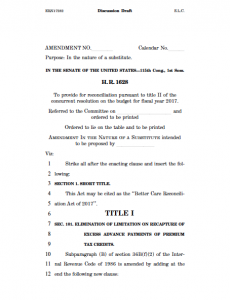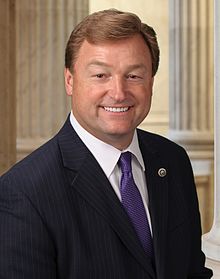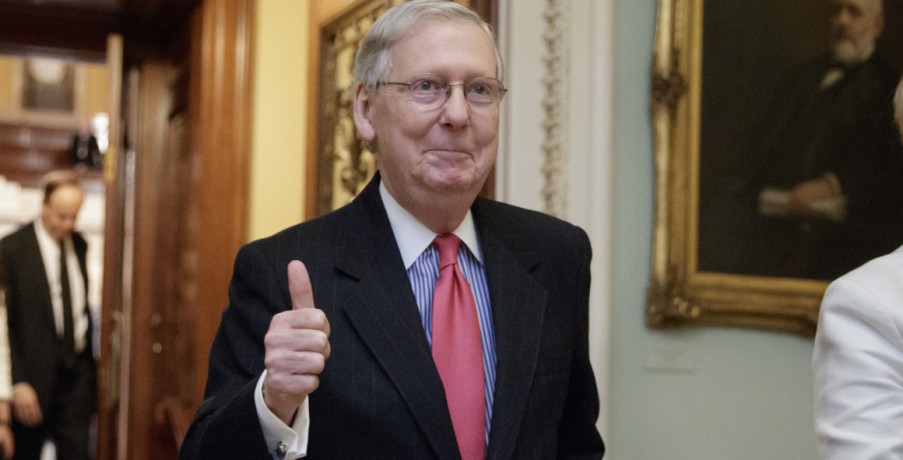
-
Senate Republicans Release Moderate Healthcare Plan, Expect to Vote Next Week
By Neil A. Carousso
Senate Republicans have released their healthcare bill, the “Better Care Reconciliation Act of 2017.” The GOP planned a vote on Thursday, but they have delayed it until after the Independence Day holiday, because it lacks the votes needed to pass.
Shortly following the news President Donald Trump invited all Senate Republicans to The White House to discuss healthcare legislation and begin negotiation of policy provisions in the bill.
Just came from WH. @realDonaldTrump is open to making bill better. Is Senate leadership?
— Rand Paul (@RandPaul) June 27, 2017
The Senate plan repeals all ObamaCare taxes in the “most expeditious manner possible,” preserves pre-existing conditions and implements enhanced health savings accounts. It removes the individual and employer mandate. Both the House-passed bill and the Senate proposal would maintain the ability for young people to remain on their parents’ insurances until age 26.
Like the House-passed bill, the Senate maintains that states will have the power to determine coverage of so-called essential benefits based on residents’ needs. The MacArthur Amendment to the House American Health Care Act seeks to allow states to waive certain ObamaCare requirements to “achieve state goals of lower premiums, stable insurance markets, increased enrollment and improved choice of insurance plans.” The Senate dropped the House provision in the AHCA to allow insurers in waiver states to charge more for those with pre-existing conditions.
The Senate bill also focuses on stabilizing the insurance markets that have been in disarray under ObamaCare by spending $15 billion in 2018 and less spending in subsequent years to wean off the Affordable Health Care Act.
The Senate bill would shrink Medicaid slower than the House passed, phasing out the Medicaid expansion by January 1, 2024. The House proposed immediately prohibiting new states from receiving an enhanced federal share for expanding Medicaid and, for states that have already adopted Medicaid expansion, would phase out the federal share by 2020. Under the Senate bill, Medicaid block grants to states to grow more slowly after 2025 than under House bill.
NO CUTS TO MEDICAID! THE FACTS ON THE GOP’S REPEAL AND REPLACE HEALTHCARE BILL
Tax credits exist under both plans. The Senate proposes to base tax credits on age and income whereas the House bill bases tax credits on age only.
Planned Parenthood would be defunded – a big win for conservatives.

The first page of the Senate’s “Better Care Reconciliation Act of 2017” has been published on the Senate Budget site. The first page of the bill has been published online for the American people. It is expected that the full text will be published after senators are briefed on the details.
The next step will be committee meetings and hearings and a negotiation between the two chambers of Congress that could see some amendments to woo some Democrats and conservative members of the Republican Party.
There are some wonky policy rules that allow for a simple majority in the Senate to pass the bill because it will be done through the budget reconciliation process. However, it has been difficult for Republicans to come to a consensus on a healthcare plan.

Sen. Dean Heller (R-NV) Sen. Dean Heller (R-NV) is the fifth and latest Republican to oppose the Senate bill. Heller is the only GOP senator up for re-election in 2018 who represents a state Hillary Clinton won in the 2016 presidential election.
Sen. Rand Paul (R-KY), Sen. Ron Johnson (R-WI), Sen. Ted Cruz (R-TX) and Sen. Mike Lee (R-UT) have also come out against the “Better Care” plan in its current form.
Without a Democrat vote, Republicans can only afford to lose 2 votes in the Senate. Vice President Mike Pence can break a tie.

First group of senators to oppose the Senate “Better Care” bill in its current form. From left to right: Rand Paul, Mike Lee, Ted Cruz and Ron Johnson. Sen. Paul, a physician, has been outspoken about his disagreements with a moderate health care repeal and replace plan. The former Republican presidential candidate calls it “ObamaCare Lite,” claiming it will not substantially lower healthcare costs for middle class Americans.
On Fox News last Thursday, Sen. Paul said the GOP is may be providing “more subsidies than ObamaCare.”
.@RandPaul: "It sounds like ObamaCare to me. It doesn't even sound like ObamaCare-lite. In some areas it may even be ObamaCare-Plus." pic.twitter.com/QvWPwvs5fQ
— Fox News (@FoxNews) June 22, 2017
Democrats are unwilling to work with the GOP to repeal former-President Barack Obama’s signature piece of legislation.
The House passed an amended version of the AHCA on May 4 with a 217-213 vote. President Trump said last Wednesday night at a “Make America Great Again Rally” in Cedar Rapids, Iowa that he told the GOP to add “heart” to the bill.
President Trump was engaged in deliberations that led up to the passage of the AHCA, making phone calls to legislators and negotiating between moderate and conservative Republicans. Mr. Trump hosted a celebratory event for House Republicans at the White House Rose Garden just following the AHCA’s passage.
The Chief Executive is involved directly with Senate Republicans to get a bill passed by next week. That’s a fast turnaround in the higher chamber of Congress.
Estimated premium hikes for 2018 were announced Wednesday – the deadline for insurance companies to decide on participation in ObamaCare. After 2017 increases in premiums and deductibles across the country, including skyrocketing costs of 116 percent in Arizona, premiums will jump double-digits next year. Maryland will see premiums rise 52 percent. Virginia and New York residents will see 2018 ObamaCare premiums growing over 40 percent (multiple insurance company double-digit percentage increases in New York). Other states are proposing over 30 percent increases in individual ObamaCare premiums.
With little to no competition in the healthcare marketplace, 41 percent of counties in the U.S. will have just one insurer option on the marketplace. Some small states only have one or no insurance options.
Principal Deputy White House Press Secretary Sarah Huckabee-Sanders would not address the specific items in the new Senate bill as it stands, telling reporters at Thursday’s press briefing, “I think [President Trump] wants to bring the stakeholders to the table, have those conversations and we’ll get back to you as we go through that process, but I think right now we’re in a negotiation process.”
President Trump hopes to sign a repeal and replace healthcare bill into law before Congress goes on August recess and then move on to the first major tax reform in 31 years featuring tax cuts for individuals and corporations to stimulate economic growth.
Featured Image: Senate Majority Leader Mitch McConnell courtesy of the Associated Press.
Social Feeds

VIDEO: Told the airline to book us on the next flight out (SPONTANEOUS TRIP!)

VIDEO: The Taylor Swift Effect | WCBS Business Breakfast

VIDEO: Future of NYC | WCBS Business Breakfast

VIDEO: Reasons for New Yorkers to be Optimistic | WCBS Business Breakfast

VIDEO: NYC's AI Chatbot | WCBS Business Breakfast


